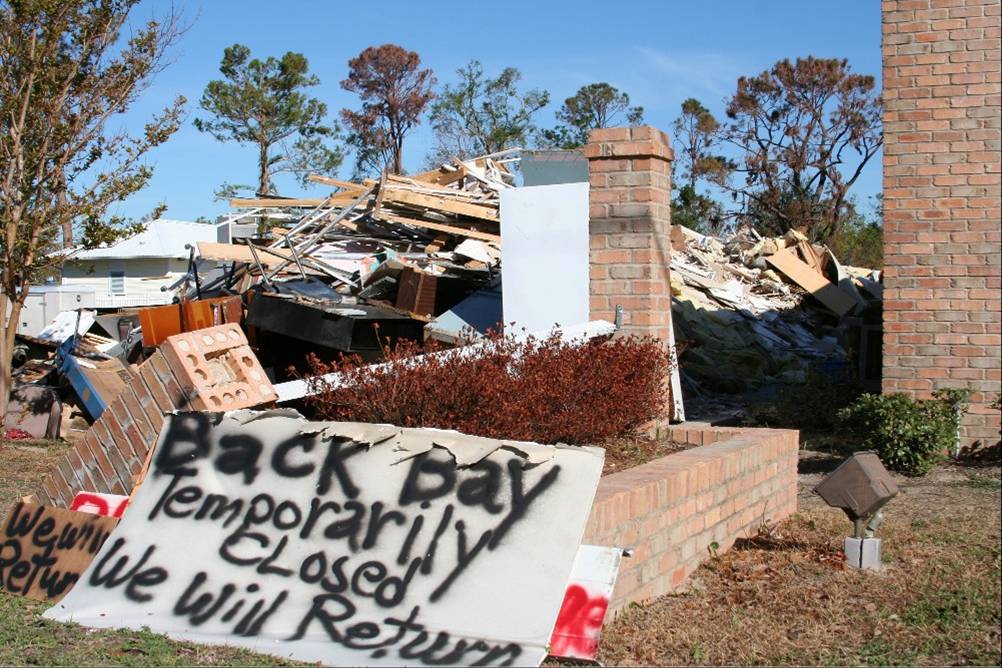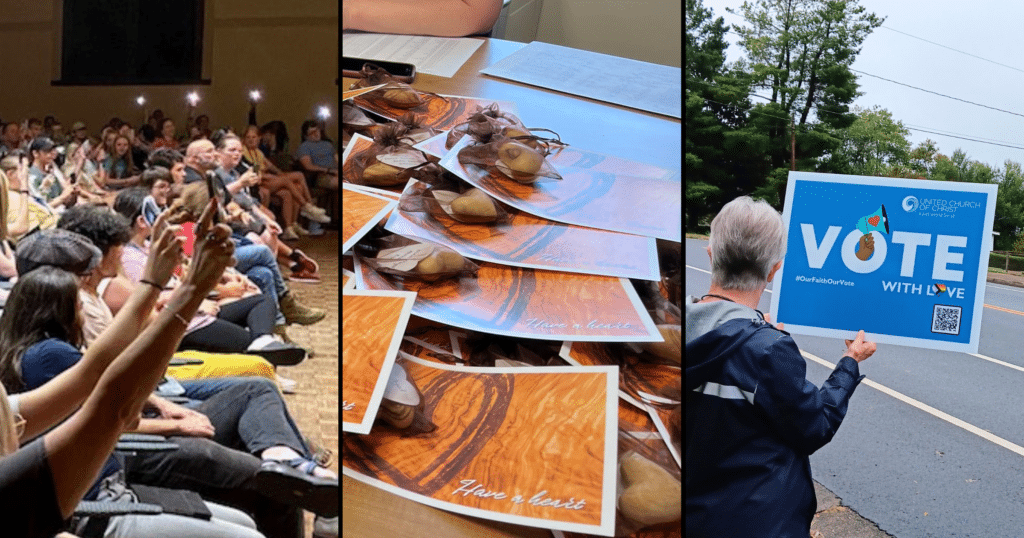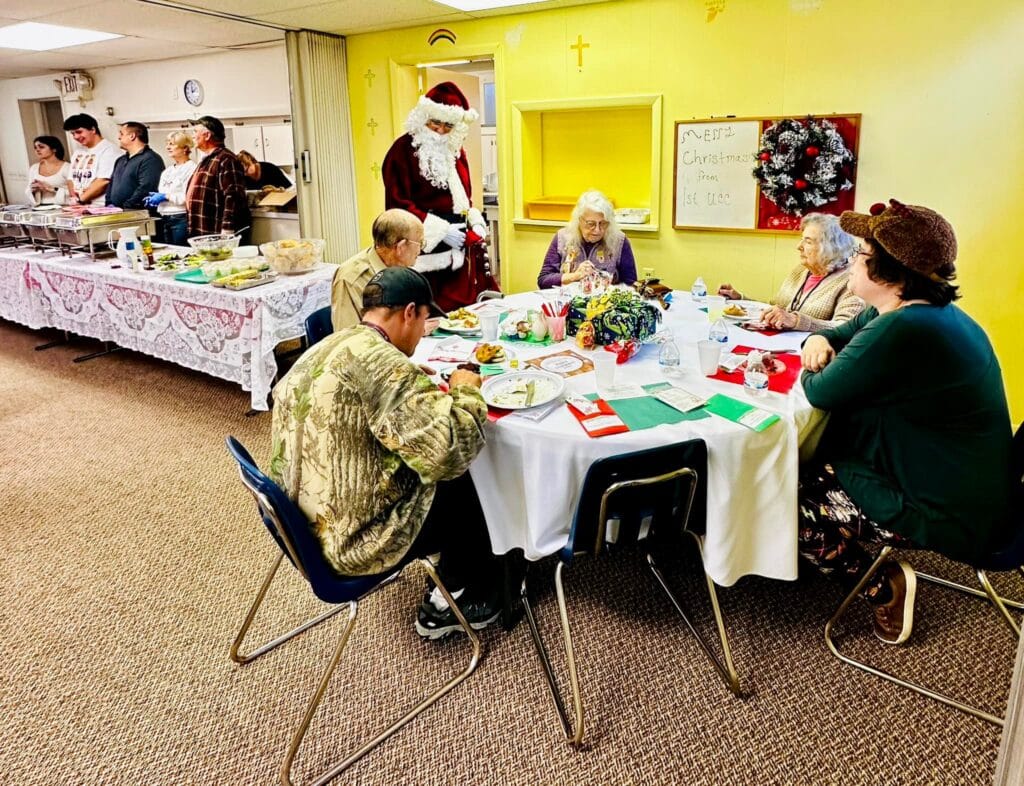Resilience and relationships remain 10 years after Hurricane Katrina
.jpg'] }}) Lives along the Gulf Coast changed forever on August 29, 2005.
Lives along the Gulf Coast changed forever on August 29, 2005.
Ripping through the region, Hurricane Katrina made landfall that day in Southeast Louisiana, and swept away houses and cars while floodwaters lingered for weeks from Texas to Florida. One of the most deadly hurricanes in United States history, and the most destructive, Katrina claimed 1,833 lives and caused about $108 billion in total property damage, while displacing hundreds of thousands of people.
Now as the 10-year anniversary of the storm approaches, people across the United Church of Christ are recalling the harrowing tales of grief, survival and recovery — and how rebuilding and renewal were made possible by the entire denomination. (Click here to read more!)
Thanks to more than $6.1 million in gifts for hurricane response, an amount that the Rev. Mary Schaller Blaufuss labeled a “huge outpouring”, the church remained engaged in the recovery effort, aiding the Gulf Coast through the end of 2011 — past its commitment of five years.
“Our financial generosity was outstanding, even being a small church in the big picture, and it reinforced long-term recovery,” said Blaufuss, team leader for the UCC Global Sharing of Resources, the ministry team that responds to natural disasters. A majority of the funds went toward rebuilding of homes, and also supported things like local food banks, initial cost of repair to local churches, cost for long-term volunteers and legal assistance.
Through UCC missions, more than 6,750 people volunteered for the recovery effort in New Orleans alone, working a total of 170,000 hours to clean out almost 850 houses and rebuild 110 homes.
Survivors of the hurricane continue to use the phrases “before Katrina” and “after Katrina.” Blaufuss heard those terms often and says they became ingrained as part of the local nomenclature. “I think what”s behind it is there was a life and order, and then a sudden disruption — the total destruction of New Orleans and the Gulf Coast was very dramatic in peoples lives,” she explained.
Blaufuss has made more than a dozen visits to the region in her capacity working with disaster recovery volunteers. For the first two years after Katrina, she visited the area “about every month or two.”
“There was a difference between the effects of Katrina on New Orleans and on the Gulf Coast,” she said. “Part of the dynamic was that so much attention was focused on New Orleans, and the limits of the government response at many levels. New Orleans became part of the consciousness of the aftermath of Katrina, the Gulf Coast probably had more extensive damage because it was right in the path of the storm. In a lot of ways, it was two different disasters from the same storm.”
In fact, about 80 percent of New Orleans was flooded, largely because the levees throughout the city failed, but about 90 percent of the entire Gulf Coast flooded, with water reaching inland as far as 12 miles.
“We were able to participate closely in the recovery of both areas, alongside Back Bay Mission in the Gulf Coast, and in New Orleans, where we helped set up some recovery work there,” Blaufuss said. “We had volunteer groups in both places.”
Back Bay Mission, a UCC ministry in Biloxi, Miss., serves the poor and marginalized in the Gulf Coast, primarily through home rehabilitation and a day center for homeless people that opened in 2010.
“Back Bay Mission had community relationships and transitioned easily into housing recovery,” Blaufuss said. “But in New Orleans, we had to build those relationships from scratch. Thankfully, were able to involve our local churches — they hosted weekly meals for volunteer groups — and it was wonderful hospitality and a time for local congregants to tell their stories of survival.”
In Mississippi, before Back Bay Mission could begin assisting the relief and recovery effort, it had to assess the destruction to its own campus, with seven of eight buildings destroyed and un-usable.
 “Immediately after the hurricane, we had nothing at all. Our campus had been entirely destroyed,” said Chris Marlin-Warfield, church relations associate for Back Bay Mission. “Only one building was salvageable and everything else had to be knocked down. Within that, we had people coming in for mission trips in the coming weeks and now we had no place to put them, so we worked on managing that aspect, and figuring out where they could work.”
“Immediately after the hurricane, we had nothing at all. Our campus had been entirely destroyed,” said Chris Marlin-Warfield, church relations associate for Back Bay Mission. “Only one building was salvageable and everything else had to be knocked down. Within that, we had people coming in for mission trips in the coming weeks and now we had no place to put them, so we worked on managing that aspect, and figuring out where they could work.”
About 7,500 volunteers worked 240,000 hours, cleaning up both the campus and more than 150 homes in the five years after the storm. It provided Back Bay with a new focus, shaping a ministry to launch affordable housing initiatives to meet the needs of the community.
“We knew that community, and we knew low-income and homeless families would be coming, and we had to make sure they got what they needed, even as we went through this recovery with them,” Marlin-Warfield said. “It was a real opportunity to reassess what we did and redefine what we did. We completely changed our housing operations, from a scrape-and-paint operation and minor repairs to full construction of homes.”
Hurricane Katrina left the nine UCC congregations in New Orleans in various states of disarray, especially Central Congregational UCC, an African American church that was unusable after it flooded with 2 feet of water. Central Congregational managed to re-open its AIDS clinic and child care center, but began worshipping at St. Matthew UCC, which was founded by German immigrants and suffered very little damage in the storm. Gradually, the two churches grew closer, and in 2011 they merged.
The Rev. Chris Mereschuk, the first pastor of Central St. Matthew, said the congregation “lives into the vision of what could be. They are deeply involved and invested in the community, and looking to be more so.”
The Rev. Brooks Berndt, the UCC’s new minister for environmental justice, is encouraging church members to make Aug. 29 a “day of listening: listening to the people still suffering from the hurricane’s aftermath 10 years later, listening to the scientists who warn us of the intensifying effect of global warming on hurricanes, and listening to the ‘still small voice’ of God prompting us to act,” he said. “Let’s have a day of listening that leads to days of action.”
One of the UCC-related colleges in New Orleans, Dillard University, will commemorate the hurricane’s anniversary and celebrate the progress since Katrina in a variety of events on campus from Aug. 26-30. The campus was virtually destroyed, sustained nearly $400 million in damage, but the school rebounded and persevered.
“While we will never forget what was lost in Hurricane Katrina and the impact that the storm had on all of us, we don”t want to dwell on the pain, we want to highlight what has been accomplished through hard work and resilience,” said Mona Duffel Jones, spokesperson for Dillard University. “We have been through the flood and the fire, as several of our buildings burned while standing in flood waters. It”s time for us to highlight our achievements and continue moving forward.”
A decade later after Katrina, what are the lessons learned from the aftermath of the storm? Said Blaufuss, “It reinforced our commitment to local communities in helping them decide how they should recover, and listening to local voices so the outsiders can best assist in the recovery. It reminded us of the importance of relationships.”
Related News
Year in Review: Top news highlights of 2024
The United Church of Christ News team has spent each week of 2024 delivering stories that...
Read MoreNo more lonely little Christmases: Chasing away the blues now and into the New Year
With the loneliness epidemic in the U.S. continuing to affect every one in five people, many...
Read MoreUCC Annual Report video brings to life impactful ministries
Leaders of the United Church of Christ are thrilled to share the newly released 2024 Annual...
Read More


